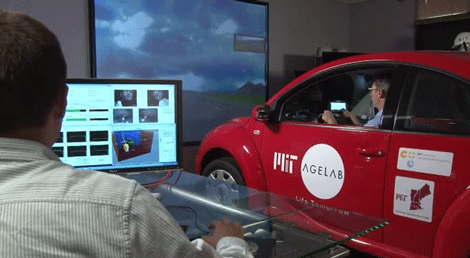
Picture: Inside the MIT AgeLab, from telematicswire.net
In 1900, life expectancy was just under 50. Today, people are living well into their 80’s, 90’s, and beyond. How can we make the most of the “bonus 30 years” we now have? According to the MIT AgeLab in Boston, MA, “longevity requires new thinking.”
The MIT AgeLab was created in 1999 as a place to conduct research and testing on technology to improve health and quality of life, and enable seniors to do more throughout their lifespan. The AgeLab works with businesses, government, and non-profits to develop new products, services, and public information for older people and those who care for them.
So, what are some of the amazing innovative things the AgeLab is doing to help better the lives of seniors and caregivers?
- AwareCar: The AwareCar was invented for use in studies by businesses and government agencies on how to optimize driver safety for seniors. It includes sensors to record data about the driver, including video cameras for environment and operator monitoring and other tools to measure velocity, lane position, driver physiology (e.g. heart rate), and eye tracking. The vehicle has been used in a variety of studies to assess hands free cellular phone usage, visual and cognitive distraction, driver health and wellness, and stress with age.
- AGNES (Age Gain Now Empathy System) is a suit that has been calibrated to approximate the motor, visual, flexibility, dexterity, and strength of a person in their mid-70s. It has been worn by students, product developers, designers, engineers, marketing, planners, architects, packaging engineers, and others to better understand the physical challenges associated with aging.
- Pharm Animals & Pill Pets: Maintaining the proper regimen of diet and medications are a challenge for most people. Seniors, who often manage more prescriptions than other age groups, are at increased risk of non-adherence. The Electronic Pill Pet uses play and emotion to remind older adults to take their medications. This “pet” is being used in research studies to assess the role of toys, pets, and play in senior health.
- Robotic Autonomous Wheelchair: AgeLab created a robotic autonomous wheelchair that learns the layout of its environment (hospital, rehabilitation center, home, etc.) through a narrated, guided tour given by the user or the user’s caregivers. The technology uses sensors to perceive the wheelchair’s surroundings, a speech interface to interpret commands, a wireless device for room-level location determination, and motor-control software to effect the wheelchair’s motion.
AgeLab conducts research on additional themes that are central to wellness and aging, including transportation and community, housing and home services, caregiving, senior health, finance and longetivity planning, and livable communities. For more examples of AgeLab research studies, please visit their Website.
As baby boomers age and face more health issues, including the treatment of chronic diseases, technology is projected to grow and change faster than ever to keep pace. Please read our blog for additional details about technology and smart device apps for seniors and caregivers.
We here at Farr Law Firm, P.C. are pleased to see all of the advances in technology and research being conducted to help improve the quality of life, health, and well-being of seniors and their caregivers. Now that you know all that is being done to make things easier for seniors and caregivers, it’s time to gain peace of mind by doing legal planning for your future and for your loved ones’ future. As a Certified Elder Law Attorney, my focus is on helping protect seniors and their families by preserving dignity, quality of life, and financial security. Call the firm today at 703-691-1888 in Fairfax, at 540-479-1435 in Fredericksburg, or at 202-587-2797 in Washington, DC to make an appointment for a consultation.
Print This Page











